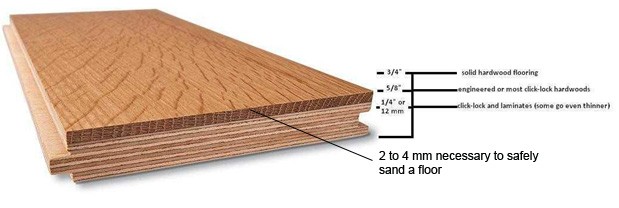Sand & Refinish
Old or heavily used hardwood floors often carry good many years of life under the distressed top surface. Sanding is known to be the least costly method to floor refurbishing. The results can be stunning not only with aged floors, but also with new, where a natural look or custom staining is desired. With this method the micro-bevels are entirely eliminated and the wood can show its true natural beauty.

If your floor is solid wood or engineered with an adequate veneer, chances are that it can be refinished and given a fresh look to last many years to come. This is an option often favored over replacing a floor. It is more economical and always more environmentally friendly since the floor life is extended up to 10 - 15 years on average. There are many questions to answer before making this decision. Here are a number of things to consider:

Existing Floor Assesment
One of the first things we want to find out is the thickness of the engineered veneer (if it's an engineered floor that we are sanding) . If the floor is solid hardwood, there is no veneer, so this is not an issue. We are looking for at least 2-3 mm veneer thickness to safely complete the sanding. If the veneer is less than 2 mm thick, sanding the floor could be a risky venture. The decision is made on case by case basis.

Next we would like to determine if structurally the floor is sound. Water damage, deep dents, or badly damaged areas could be replaced if the material is still commercially available or custom produced.
Once we determined that sanding is feasible, we discuss duration, materials needed, desired colors and finishing options available. Preferences of varnish, oil, water based, urethane or alcohol based finishes are suitable with pros and cons. Understanding your goals helps deliver to your expectation.
Materials Selection


Stains, Water Based Urethane, Alcohol Based Urethane, Oil Finishes, Hard-wax Oils
Site Preparation
Space preparation and isolation of the sanding area helps contain dust particles entering the living space. Most commercial sanders are equiped with dust collectors and often attaching a HEPA vaccum or utilizing "dustless systems" will significantly reduce wood dust.
Get a Quote
Thank you very much for your interest. We'll get back to you shortly.


